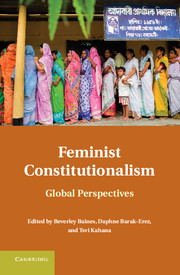Book contents
- Frontmatter
- Contents
- Foreword
- Contributors
- Introduction
- Part I Feminism as a Challenge to Constitutional Theory
- Part II Feminism and Judging
- Part III Feminism, Democracy, and Political Participation
- Part IV The Constitutionalism of Reproductive Rights
- Part V Women's Rights, Multiculturalism, and Diversity
- Part VI Women between Secularism and Religion
- 22 Secular Constitutionalism and Muslim Women's Rights
- 23 On God, Promises, and Money
- 24 Polygamy and Feminist Constitutionalism
- Index
- References
24 - Polygamy and Feminist Constitutionalism
Published online by Cambridge University Press: 05 June 2012
- Frontmatter
- Contents
- Foreword
- Contributors
- Introduction
- Part I Feminism as a Challenge to Constitutional Theory
- Part II Feminism and Judging
- Part III Feminism, Democracy, and Political Participation
- Part IV The Constitutionalism of Reproductive Rights
- Part V Women's Rights, Multiculturalism, and Diversity
- Part VI Women between Secularism and Religion
- 22 Secular Constitutionalism and Muslim Women's Rights
- 23 On God, Promises, and Money
- 24 Polygamy and Feminist Constitutionalism
- Index
- References
Summary
Feminist Constitutionalism's Dilemma
Polygamy poses a dilemma for feminist constitutionalism. Canada offers the perfect crucible for understanding this dilemma. Not only is polygamy a crime but also Canada justifies criminalization on the grounds of protecting women and children, thereby attracting the attention and concern of feminists. For their part, constitutionalists will address polygamy because the constitutionality of criminalizing it has just been referred to the courts. However, feminists and constitutionalists will differ over the appropriate outcome for this case. Because most feminists believe polygamy is harmful to women, they will support continued criminalization. By definition, on the other hand, constitutionalists advocate limiting the powers of liberal states, meaning they will seek decriminalization. In sum, the issue of de/criminalizing polygamy polarizes feminists and constitutionalists, creating a dilemma for those who choose to subscribe to feminist constitutionalism.
Fortunately, feminist constitutionalism is a sufficiently novel concept that it is still under construction. In Canada, the relationship between feminism and constitutionalism has gone through several stages over the past quarter century. Constitutional scholar and feminist Donna Greschner typified the preliminary stage when she posed this provocative question: “Can constitutions be for women too?” The second stage consisted of many feminist and constitutional scholars – indeed, too many to mention individually by name – applying feminist analysis to various issues of constitutional law. Thus scholarly research progressed from women to feminism and from constitutions to constitutionalism during these first two stages. For the current state, what remains is to elaborate the relationship between these “isms.”
- Type
- Chapter
- Information
- Feminist ConstitutionalismGlobal Perspectives, pp. 452 - 474Publisher: Cambridge University PressPrint publication year: 2012
References
- 1
- Cited by



